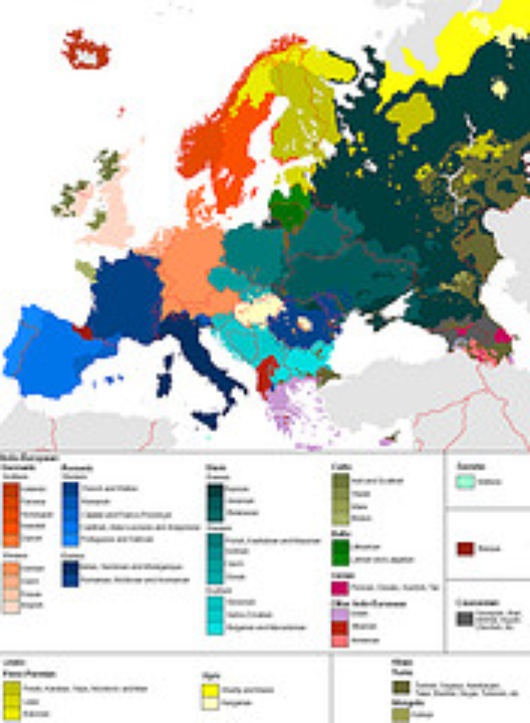
Claude Truchot: “Europe has to be multilingual!”
Published on
Strasbourg, July 1st, 2008 By Vincent Lebrou Translation by Géraldine Guérin Claude Truchot is a specialist of language issues in the European expansion, renowned professor at Marc Bloch University, Strasbourg, France. For Babel Strasbourg, he analyses the recent evolutions of the interactions between languages in Europe.
 Amin Maaloof recently presided at an intellectual group whose report recommends the concept of the adoptive native language. This report would like that the teaching of this second adoptive language is favored, not to be only limited to English. Do you think this concept is useful ?
Amin Maaloof recently presided at an intellectual group whose report recommends the concept of the adoptive native language. This report would like that the teaching of this second adoptive language is favored, not to be only limited to English. Do you think this concept is useful ?
Indeed, the important concept in the Maaloof report for me is that other languages should be included, as people would have to know, learn and practice English sooner or later. We could include other languages closer to us than English is, as English is often more a tool or a travel language than a native language. This approach, which consists in favoring a closer language, could be a good alternative. But is it realistic? It could be if political players make this choice. Unfortunately, their choices are usually driven by economical imperatives or electoral pressure. Currently, English is strongly requested. We would need to convince people that learning English, as a first foreign language is not the best choice. At this point, political players can intervene to explain the different options. Maybe promoting a strong concept such as the adoptive native language could help.
In your opinion, why a multilingual Europe – which in any case will not function only in English – is required?
You need to understand a key point: up to now, the European expansion has worked based on a principle which can be qualified as one of subsidiary status:
there are institutions, and also countries which function by strongly articulating their actions with the ones of the institutions. It is difficult to imagine that the countries, which make decisions in The Council of Europe, could initiate the European agreements if everything was done in this unique language. Such a process can only be made in the country’s own language! Let’s take an example, still relevant today. Currently, the constitution project is being ratified. But political debates on this constitutional project do not take place in English. These debates take place in the language of each country. In Ireland, they take place in English and also in the UK but not in France, or in the Czech Republic or elsewhere. National parliaments deliberate and decide in the country’s native language. Furthermore, if the ratification is made by referendum, debates will of course take place in each country’s language. The directives themselves are country directed and are initiated in each country in their own language. I do not see how they could be initiated in a foreign language. Hence, this discussion between the institutions, which proceed with a limited number of languages, and the countries, which can only function in their own language(s), needs to exist. Otherwise the European expansion could not advance. For this reason, the European expansion has to be multilingual. It is the sine qua non condition of the functioning of the European Union!
In some way, we are returning to Mr. Maalouf’s report: he would like bilateral relationships between two countries to occur not in English, but in the languages of the concerned countries. Do you have same idea ?
To favor the languages of the partners instead of a vehicular language is an attitude to adopt! It is not easy for people to accept such a concept, because in people’s mind, having relationships with another language speaker requires a vehicular language. It is not true at all, at the level of the individuals as well as at the level of the institutions. Let me give you a small example, indeed anecdotal but very revealing: outside of Café Babel, I surf on other websites, and not very long ago, I found a French forum concerning the defeat of France during the European football championship. People from different nationalities, including Italians, were participating on this website. One of the Italians made a comment about the French defeat in very poor English, almost gibberish. I could not help thinking that this Italian did not need to write in English. If he could not speak French, then he could just have written in Italian. For a French speaker, it is not very difficult to understand written Italian. Usually written conversation, something sent by email, is quite easy to understand. Here, we are entering a communication mode that people do not understand, which does not come to mind immediately, but which is fundamental. When two people speak close languages, it is easier if each uses their own language, and with some practice, they will end up understanding each other. Similarly, it will not be very difficult to speak the other person’s language. It is easier to communicate in Italian for French speakers and in French for Italian speakers, than to communicate in English, which is not such an easy language in which to communicate.
Not as easy as people think or say.
In reality, it depends on the level. English can appear to be quite simple, because of the grammar. I will not enter into linguistic details, but the grammar does not comport declinations like German, and other things like this. Sentence structures are similar to French, so people think it is easy, but in reality it is a very difficult language. It is even more difficult for French speakers, as it comports lot of words of Latin origin, which do not correspond to French words, and it is very easy to make a mistake!
Can respect and promotion of the linguistic diversity constitute sine qua non conditions for the raising of a real European identity?
There is a very strong implantation of languages in Europe nowadays, notably national languages. On the contrary, other languages are dying, in particular regional ones, which does not mean that people are not attached to them; on the contrary, there is a strong attachment to dialects, but it tends to be affective and it corresponds less and less to use. On the opposite, national languages are extremely well implanted and widely used, and I think that, for the vast majority, these are native languages and people are attached to them. This is the reality of Europe. The attachment of people to their own language, which seems quite understandable to me, should not transform to nationalism, it should not become an excuse for exclusion. We could cultivate the affection, the interest for a language while still being open to other ones languages. Making the effort to speak to someone in his language is a sign of openness and acceptance I think one is a lot more closed minded to the other one when one only wants to communicate in a vehicular language. When one only wants to speak in their own language, it is a sign of closemindedness. I think that it is essential to try to speak in one other language and trying to speak several languages. Being multilingual is a way of being open. Only speaking native language and English is not being open. When you speak English at work, it becomes a communication tool; there is no affective attachment, no symbol of diversity. I think Europe needs to open to diversity, it seems obvious to me. Not only to create a European identity, but also to create an entire European state of mind.
Indeed, should not the particular geographical context in which we are located, Strasbourg, border city, favor this language learning?
It seems to me a necessity that is not always taken into account. Big efforts have been made in Alsace to teach German. On the German side, it has been more difficult; a project has been ongoing for several years with some success. It aims to teach French since primary school, but it has encountered hostility from lots of parents. They think that their kids would be lost if they do not learn English. It is difficult to convince them that it is easier to start with French, as we are located next to the border. Later on, they could move on to English easily, as English is used widely by German neighbors. The difficulty does not really exist, except in peoples mind. Concerning Alsace, we can feel proud of the efforts made to teach German. There is still a loss both from a quantitative and qualitative point of view. 15 to 20 years ago, Alsace was a reservoir of German speakers. A vast percentage of translators and interpreters of the European Union, who translated from and to German, were from Alsace, because they were bilingual. But there are less and less bilingual speakers; families do not learn languages as much. It is worrying.
“It is non-sense to not favor other languages anymore”
 At a global level, are foreign languages such as German still attractive enough?
We also have to look at things from a more global point of view: there is a dramatic decrease of German studies students in France. Paradoxically, there are not enough people to work in collaboration with the German economics market, although there are lots of opportunities. I know several students in German studies here who found a job quite easily because of their knowledge of German: there is an open market. We act a little foolishly: we want English, but there are lots of demands in other languages. Economically, it is non-sense. Maybe not total non-sense, I do not deny the utility of English, but I think that in terms of public policy, it is non-sense not to favor other languages as well.
At a global level, are foreign languages such as German still attractive enough?
We also have to look at things from a more global point of view: there is a dramatic decrease of German studies students in France. Paradoxically, there are not enough people to work in collaboration with the German economics market, although there are lots of opportunities. I know several students in German studies here who found a job quite easily because of their knowledge of German: there is an open market. We act a little foolishly: we want English, but there are lots of demands in other languages. Economically, it is non-sense. Maybe not total non-sense, I do not deny the utility of English, but I think that in terms of public policy, it is non-sense not to favor other languages as well.
Can it lead to political issues? Can speaking several languages, in addition to English, be an advantage in the competitiveness of a sector, of a country?
It is likely, even if it is tough to prove. Studies have been made on this topic. There has been a report showing that the more languages one knows, the more competitive one is. If one cannot speak well enough in certain languages, markets are lost. This argument has been widely used in the United Kingdom, where for the longest time English was the unique language in the business world. Several studies have shown that English people lost markets precisely because they are not learning foreign languages anymore. There are elements demonstrating this. Are there other arguments? I think so, but it is a lot harder to demonstrate. Let’s take the example of a French company working worldwide. When looking for a new collaborator, the company will insist on speaking English. But in reality, a French company hiring someone to work abroad will hire a English speaking French person, but this person would also need to know the language of the country to have an impact in this country. If the company hires a foreigner working in the country, let’s say if a French company wants to do business in Italy, the company will hire an English speaking Italian. But if this Italian does not speak French, how would he stay in close contact with the French company? Here again, hiring would be made on the English basis, but what appears less, is the knowledge of other languages. This needs to be highlighted and it usually appears a lot less. For a company, it can be a drawback to search for a French speaking Italian. Hence, the company will ask for fluent English. In reality, when hiring, the company will rather hire the French speaker, who would immediately be functional. Simply, because it will make things a lot easier for the company to hire someone who already speaks French.
Has the scenario you are describing already occurred?
Let’s take the example of Dassia. Renault bought Dassia in Romania and I don’t think that Renault required Dassia’s executives to speak French. But a vast majority of Dassia executives spoke French, and for them it was a lot easier to integrate into Renault’s team by speaking the language of the company. Renault’s implantation in Romania was facilitated, because French was well known in this country. It was a lot easier than when Renault implanted in Slovenia at the beginning of the nineties, with lots of problems. The French did not speak Slovenian and the Slovenians did not speak French, which had been a huge brake to the factory’s implantation for at least 10 years. They had to invest an amazing amount of money on language classes, issues that did not occur when they implanted in Romania. These issues are not well known, but they are fundamental, even more than learning English. And I do not say that learning English is useless!
A last question: earlier, I found the first communication on The Multilingual Committee of 2005. The philosophy was “The more languages you know, the more human you are”. Do you agree with this philosophy?
It is an attractive philosophy. There was another one that I doubted more. It was also in 2005, it was “Together since 1957” (in English in the text). This tag line was not very relevant to me, because it tended to be only diffused in English, but it was then translated. A lot of people protested: we are together does not mean we have a shared language. I think the tag line you mentioned is more relevant.
Also see the article published in Le Monde Diplomatique: La langue, c’est aussi de la politique.
(Photo 1: flickr/ plymouth libraries)
(Photo 2: flickr / mcdowell)



